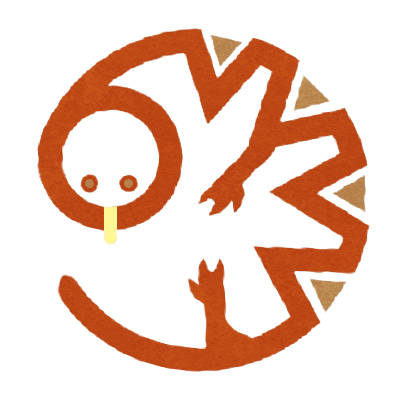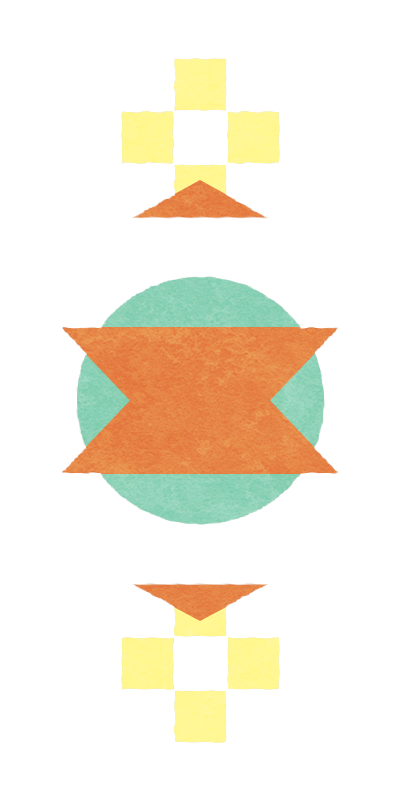The Tollouchi are a people who believe themselves to be cursed by fate. They try their best to distract themselves from their ever-encroaching doom with jest, entertainment, and throwing themselves into perfecting a craft.
Living in the now largely deforested territories of Romtol, the Tollouchi have adapted to life in the treetops. Their bodies are fairly hairy with their short hair covering their forearms, legs, chests, heads, and backs— the rest is sandy-brown colored skin. They have long, sturdy arms extending down to their shins, and prehensile feet— making them adept climbers, and giving them an agile edge in combat. Their facial hair grows faster and thicker than many of their contemporaries, and they typically posses thicker eyebrows. Their jaws jut out slightly— and are longer than that of an average human's. Their flatter noses are similar to those of the Coulqepluex.
Long ago, the great jungles of Puloum filled the land of Romtol. The Tollouchi were at home in the canopies here. However, some desired to live upon greater heights, larger trees, and larger homes within them. The Romtuun king was one such individual— who offered a great reward for anyone able to produce such great trees.
Occultists, maniacs, knew of a way— or thought they did. A small group shared a dream shortly after the king's reward was announced, which drove them to madness— and a horrid ritual which merged their consciousnesses with the trees around them. These trees grew rapidly, and began to overrun Tollouchi settlements until a fire was accidentally set— buying those that remained time, and burning much of the great Puloum to the ground.
Those that survived left the treetops— not knowing what caused the terrible incident, believing that it could happen again at any moment— and began to build anew on the ground floor. What hadn't been burned was felled, and it wasn't long until the cursed woods— now known as Rotomul— snuck upon their cities once again. A tradition began, and every year the living forest is burnt back.
Some never return, finding a less stressful existence elsewhere, but most come home after a period of weeks to months and join the workforce in full.
Plays are a popular pastime, and as such, playwrights are abundant as well. Smiths find work at home and abroad, too, forging pieces of armor and weaponry as beautiful as they are sturdy.
In pursuit of this ideal, Tollouchi settlements are tall, and great terraces of wood snake throughout— like artificial hills. Grand entrances dot the edges of the terraces, and most structures are built hanging from the ceilings within. On the outside, long platforms extend from the edges, allowing structures to be built from underneath. Towers, windows, and other structures break through the wooden surface.
Long stretches of thin wooden platforms kept a couple yards above the surface wind through their streets, as well as over, under, and around structures. The Tollouchi are adept climbers, and this allows for great mobility throughout their settlements. Trees are planted and grown where possible, but are isolated from one another in stone containers. Guards are sent to check on them periodically— ensuring the curse does not begin anew.
There is no organized Tollouchi religion, though there is somewhat of a generally accepted philosophy. Fatalism runs rampant through the populace of Romtol, with war brewing on either side of their country, stress is high. Many believe that they are simply fated to a long, slow death. Perhaps they had defied fate by escaping the cursed woods hundreds of years ago— this particular notion is often scoffed at, however. You cannot change fate. It is preordained.
With this terrifying prospect in mind, many Tollouchi seek to fill their minds with something— anything— but the reality that faces them
Arboreal Adaptations
A Home Destroyed
Occultists, maniacs, knew of a way— or thought they did. A small group shared a dream shortly after the king's reward was announced, which drove them to madness— and a horrid ritual which merged their consciousnesses with the trees around them. These trees grew rapidly, and began to overrun Tollouchi settlements until a fire was accidentally set— buying those that remained time, and burning much of the great Puloum to the ground.
Those that survived left the treetops— not knowing what caused the terrible incident, believing that it could happen again at any moment— and began to build anew on the ground floor. What hadn't been burned was felled, and it wasn't long until the cursed woods— now known as Rotomul— snuck upon their cities once again. A tradition began, and every year the living forest is burnt back.
Tradtions
Greetings & farewells
When greeting strangers, a Tollouchi will do anything from giving a respectful thump of the chest, to a mocking face— just to see how the other party reacts. For those close to them, authorities, and those above them in status, it is almost always the respectful chest thump tied with a nod of the head. Farewells are rarely executed.Lest we forget that any moment could be our last, I'd rather greet the dawn than see it away.
Milestones
Birth
Birth is a bittersweet event for many Tollouchi. The joy of new life, experiences and a future— a future that may never be. A future that may be filled with horror and suffering. Celebrations thrown around births are truly more for the adults to take their mind off these depressing thoughts, than for the child itself. Drinking and dancing often accompanies these events— on some occasions seeing the newborn fed the wrong bottle.
Come on, don't cry— believe me, you'll need it, kid.
Coming of age
Around the age of 15— the exact age varies— Tollouchi youth will travel somewhere new. Be it a new city, a new nation— or a new continent.Some never return, finding a less stressful existence elsewhere, but most come home after a period of weeks to months and join the workforce in full.
Death
When someone dies, they are sealed within a hollowed tree trunk, which is stacked and fastened to others within a burial forest.Eating
Tollouchi believe it a waste to wait on enjoyment, the moment food arrives, they begin devouring it. Some simply forgo cooking and eat their ingredients raw.War
War is a show, at least on the exterior. A dance, a jest, a musical— whatever manages to take the true horrors off the minds of the Tollouchi. Their armor is elegant in make, their combat style unique and fluid— something well practiced and honed. Despite this facade, they are well organized in battle.Ideals, Love & Gender
Relationships
The Tollouchi believe that life is too short to spend with only one person. As such, polyamory is the norm. Most couples only consist of 2-4 partners total, but some of the rich and influential have entire houses of partners. Marriage is most often saved until a child is born, but there are no qualms with those who marry beforehand.Beauty
Most Tollouchi will shave unique patterns into their hair— most typically their chests and stomachs, but arm designs are not uncommon, either. These patterns are often floral in design, depicting vines twirling around the wearer. Facial hair is often braided at the very ends, and rolled back under the neck before being fasted to it with a wooden pin.Gender
The primary difference between the genders is that one is expected to follow more closely the parent that shares their gender. Boys are expected to learn more from their fathers than their mothers, for example. This is reflected in the method that family names are passed— by gender. Despite this, whenever the practice must have began, all genders had enjoyed fairly equal roles in Tollouchi society— meaning that the same is mostly true today. However, some family lines are wont to hold different standards for each gender.Art, Architecture, and Dress
Art
Tollouchi craftspeople are sought after by those in far off lands— their skill is nigh unmatched when it comes to woodworking. Astoundingly intricate wood carvings grace the backs of masterfully joined chairs. Many Tollouchi place as much time as possible into escapism, often leading into unhealthily long periods spent honing their crafts.Plays are a popular pastime, and as such, playwrights are abundant as well. Smiths find work at home and abroad, too, forging pieces of armor and weaponry as beautiful as they are sturdy.
Architecture
Tollouchi architecture is constructed primarily from lumber, felled from the now small forests that remain, and salvaged from the annual burning. The cursed lumber of Rotomul is particularly hardy, and once burned, is extremely fire resistant. It is said that if one closely inspects the patterns etched into the wood, screaming faces can be seen. Their settlements are constructed in a unique manner— attempting to emulate the mobility and aesthetic of the canopy cities they once inhabited.In pursuit of this ideal, Tollouchi settlements are tall, and great terraces of wood snake throughout— like artificial hills. Grand entrances dot the edges of the terraces, and most structures are built hanging from the ceilings within. On the outside, long platforms extend from the edges, allowing structures to be built from underneath. Towers, windows, and other structures break through the wooden surface.
Long stretches of thin wooden platforms kept a couple yards above the surface wind through their streets, as well as over, under, and around structures. The Tollouchi are adept climbers, and this allows for great mobility throughout their settlements. Trees are planted and grown where possible, but are isolated from one another in stone containers. Guards are sent to check on them periodically— ensuring the curse does not begin anew.
Dress
Tollouchi clothing is typically light, bright, and colorful. Most clothes consist of a number of lightweight colored sashes— typically about three, two on one shoulder and one on the other— which are tied at their lowest ends around a metal ring at the hip. Tied at the bottom of this ring are two more sashes, which cross over the opposite hip. This allows for light cover and protection from the sun, exposure of one's hair patterns, and the flexibility to adjust for more coverage as felt necessary. These sashes are also commonly used as tools to be used in jest, such as tripping over a friend, or to play games with.Religion & Myth
With this terrifying prospect in mind, many Tollouchi seek to fill their minds with something— anything— but the reality that faces them
Toh-loo-kee
Competitive Brewing
Unlike many of their contemporaries, Tollouchi taverns do not serve drinks. Instead— in these wooden structures composed of merely a basement, a roof, and an assortment of poles to support it— they serve ingredients and the tools for processing them.Various cereals and grains are kept in the basement, alongside barrels of water and yeast.
If one wishes to save time, there are pre-malted and mashed grains, and even kegs just entering the fermentation stage. Ingredients from home are allowed, as well.
Some, short on time and money, simply mix the brews of others and call it their own. Regardless of their method, Tollouchi will compete with friends, family, strangers and even diplomats over who can create the best drink.
Some, however, simply use the opportunity to see others drink unsavory concoctions.
Split lines
With family names merely passing down from father to son, and mother to daughter— families can completely split over time. Married couples may act separately, in different households— with their own families.This often leads to the men and women of the same family possessing entirely different values and dynamics.
In some cases family lines are reunited centuries after their original split— only to split off again soon after.
Kin
A variety of small monkeys used to inhabit Puloum before the curse, and much of it being burned away.Unfortunately, many of these species did not seem to survive the catastrophe, gone unseen since.
Those that survived have found their way to adjacent forests, and others have made new homes within Tollouchi settlements.
The similarity in appearance between them and the Tollouchi has not gone unnoticed, either. Many Tollouchi believe these monkeys to originate from a long lost group of orphaned children, hundreds and hundreds of years ago.
As such, they try to be kind to the creatures when possible.








Okkk so! Here we go. First offni commend you. It's like you knew it was coming XD that quote under the fact that they don't do farewells, excellent! "and fasted to others within a burial forest." Fastened? Now this next point goes different ways. So, polygamy is one husband, multiple wives. Zoology, however, defines it as you've used it, but since humans are reading, but since humans are reading, may I suggest a different more accurate term? What ur describing is more like polyamory, at least in my experience, since marriage is not a specific element, nor is gender. Also, entire houses of partners? God that's a lot of work. Oof. So I really like that these guys stand out so much. Compared to your other people, who all seem to have a drive that moves them, these guys are basically existstencial crisis in living form XD I loved how you describe their various traditions, particularly their architecture. Their funerary rite is interesting as well, a rather unique concept of the coffin in my mind. Excellent work!
Thanks! I felt that was a good, concise way to explain the farewells and tie it into their art at the same time! And thanks for catching that typo, it has been silenced.
Polygamy is not one husband and multiple wives, that is specifically referred to as "polygyny"— which is a type of polygamy! Polygamy is just having multiple spouses, regardless of gender. Both words apply to zoology as well, but I was using them in the human sense here. That said, you DO have a point on polyamory being a better term— it was a case where it was on the tip of my tongue and refused to leave. I'll swap that out!
Yeah, the Tollouchi are like the antithesis to the Linnh. Both have a constant threat at their doorstep, but the Tollouchi don't deal with theirs as proudly. Not to mention, they have the added pressure of potential war on two fronts looming over the horizon.
Glad you enjoyed it!
True, but Polygamy is socially understood to be a man and many wives. Forgot that the next step. That would be my mistake. Butttt it is required to refer to spouses or mates, by definition lol sorry, thats embarrassing. Either way glad i could provide the word, I hate it it when a word eludes me. Truth. It's a dire position and not one many woodland be happy in, the seem to get by though as well as they can XD. I did. looking forward to more. Have I read the linnh? That word doesnt doesn't ring a bell. Hmmm.
All good! There are too many words for us to remember perfectly! The Linnh were the coastal people that relied on music as a defense against an eldritch being, and music played a large part in their culture.
AHHH yes, the bard people! I remember now. i think that was the first of the ethic groups I read. and yeah, way to many words. till next time my friend. have a good one!